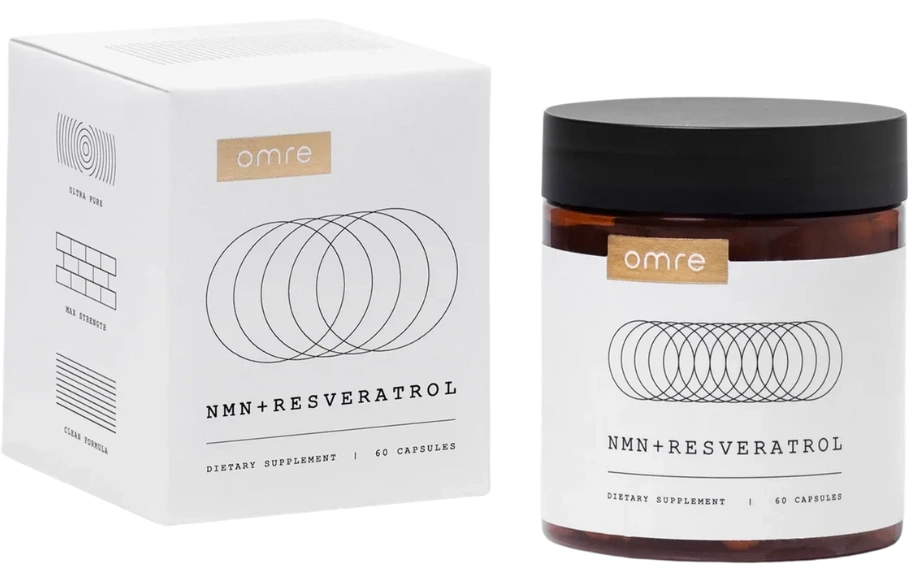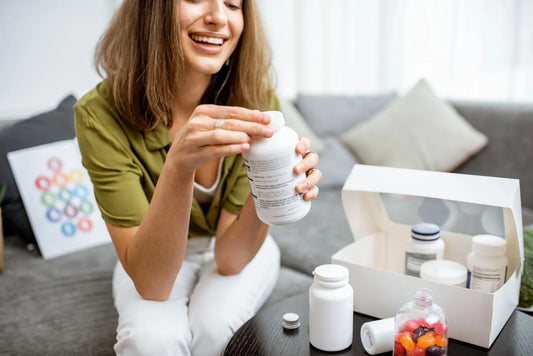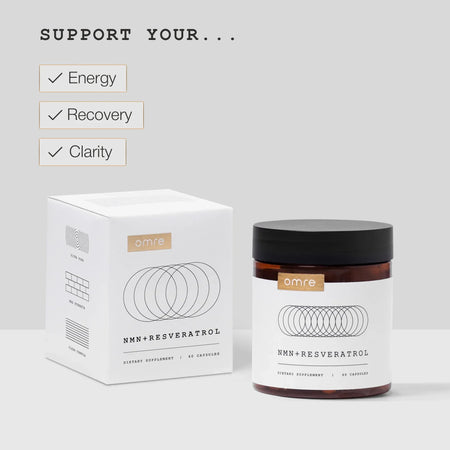Table of Contents
Resveratrol and grape seed extract are both powerful antioxidants found in grapes, but they work differently in the body.
If you're deciding between the two, understanding their unique benefits and key differences can help you choose the right one for your health goals.
NMN + RESVERATROL
Cellular NAD+ booster with ultra‑pure NMN and Resveratrol, at research‑backed doses.*
TL;DR
Resveratrol and grape seed extract both offer strong antioxidant benefits, but work differently. Resveratrol supports heart health, brain aging, and longevity. Grape seed extract helps with blood pressure, collagen, and inflammation. You can take both together, but choose based on your goal: resveratrol for anti-aging and brain support, grape seed extract for circulation and skin health.
What Are Resveratrol and Grape Seed Extract?
-v1753231075035.webp) Resveratrol and grape seed extract are antioxidant compounds found in different parts of the grape. Resveratrol comes from grape skins and is known for heart and longevity support.
Resveratrol and grape seed extract are antioxidant compounds found in different parts of the grape. Resveratrol comes from grape skins and is known for heart and longevity support.
Grape seed extract is made from the seeds and offers broader benefits for blood pressure, collagen, and circulation.
Both have antioxidant effects but support the body in different ways. Here's how they compare.
What is Resveratrol?
Resveratrol is a natural compound found in grape skin, red wine, peanuts, and berries. It’s a type of polyphenol known for activating sirtuins, often called “longevity genes.”
Researchers believe resveratrol may help reduce inflammation, protect blood vessels, and support brain health as we age.
Acts as a phytoestrogen with mild estrogen-like activity
Supports nitric oxide production for heart health
May slow aging at the cellular level
Shown to reduce beta-amyloid buildup in the brain (linked to Alzheimer’s)
You’ll find the highest natural levels in red wine, though supplements offer stronger doses (typically 250–500 mg).
What is Grape Seed Extract?
Grape seed extract (GSE) is made by drying and grinding the seeds of grapes. It contains a blend of antioxidants, especially proanthocyanidins (OPCs), which are known for their strong free-radical fighting ability.
GSE is often used to improve circulation, reduce blood pressure, and support skin and connective tissue.
Rich in OPCs, vitamin E, and flavonoids
Supports collagen and skin elasticity
Helps improve blood flow and reduce swelling
May aid in protecting the brain and reducing oxidative stress
GSE supplements are usually standardized to 85–95% OPCs for reliable antioxidant activity.
Resveratrol vs Grape Seed Extract: Key Differences
While both support health in different ways, the source and active compounds set them apart.
Now let's break down those differences in more detail.
Source and Composition
Resveratrol comes from grape skin, while grape seed extract comes from the seed. Each part of the grape offers a different chemical profile. Resveratrol is a single molecule. Grape seed extract contains many compounds that work together.
Mechanisms in the Body
Resveratrol activates sirtuins, mimics calorie restriction, and supports nitric oxide production. Grape seed extract works mostly through free-radical scavenging, blood vessel protection, and anti-inflammatory effects from OPCs.
Health Focus
If your focus is on longevity, heart health, or cognitive support, resveratrol may be a better fit. For skin, collagen, and circulation, grape seed extract offers more direct support.
Hormonal Effects
Resveratrol acts like a phytoestrogen and may affect estrogen-sensitive conditions. Grape seed extract does not have these effects, making it a safer option for those avoiding estrogen-like compounds.
Health Benefits Compared
-v1753232549014.webp) Both resveratrol and grape seed extract offer strong antioxidant protection, but their specific health effects differ. Resveratrol is best known for supporting heart health, longevity, and brain aging. Grape seed extract shines in promoting blood circulation, collagen repair, and reducing inflammation.
Both resveratrol and grape seed extract offer strong antioxidant protection, but their specific health effects differ. Resveratrol is best known for supporting heart health, longevity, and brain aging. Grape seed extract shines in promoting blood circulation, collagen repair, and reducing inflammation.
Let’s break down the research behind each benefit.
1. Antioxidant Activity
Both compounds neutralize harmful free radicals, reducing oxidative stress in the body.
Resveratrol works by activating antioxidant enzymes like superoxide dismutase (SOD) and catalase. One study found resveratrol reduced oxidative stress markers in humans after just 30 days (1).
Grape Seed Extract contains high levels of oligomeric proanthocyanidins (OPCs), which are up to 20 times more powerful than vitamin C and 50 times stronger than vitamin E in antioxidant activity, according to a study (2).
2. Heart and Blood Vessel Health
Resveratrol helps the heart by relaxing blood vessels, while grape seed extract supports circulation and blood pressure.
Resveratrol increases nitric oxide (NO) production, which helps widen blood vessels and improve blood flow. A 2020 meta-analysis in Pharmacological Research showed resveratrol can reduce both systolic and diastolic blood pressure in people with cardiovascular risks (3).
Grape Seed Extract may be even more effective for blood pressure. A review of 16 studies with over 800 people found that daily GSE intake reduced systolic BP by ~6 mmHg and diastolic BP by ~2.8 mmHg (4).
NMN + RESVERATROL
Cellular NAD+ booster with ultra‑pure NMN and Resveratrol, at research‑backed doses.*
3. Brain Function and Cognitive Protection
Both supplements may help protect brain cells and support memory, but they act in different ways.
Resveratrol crosses the blood-brain barrier and has been shown to reduce beta-amyloid plaques, linked to Alzheimer’s disease. A 2020 clinical study found that 200 mg of resveratrol daily helped preserve cognitive function in people with mild Alzheimer's (5).
Grape Seed Extract supports brain health by lowering inflammation and preventing oxidative damage. Animal studies show it can reduce memory loss and block amyloid fibril formation thanks to compounds like gallic acid (6).
4. Skin, Collagen, and Anti-Aging Support
Grape seed extract is more widely used for skin and collagen support.
GSE improves skin elasticity, wound healing, and collagen strength. A study found that topical grape seed extract helped with wound closure and new tissue growth (7).
Resveratrol may support skin indirectly by reducing inflammation and oxidative stress. It’s also used in skincare products for its calming and anti-aging effects.
5. Cancer Research and Immune Support
Both compounds show cancer-fighting potential in lab and animal studies, but human evidence is limited.
Resveratrol may inhibit tumor growth by affecting gene expression, hormone levels, and inflammation. It's been studied for breast, prostate, and colon cancers (8).
Grape Seed Extract has shown anti-cancer effects in animal models, especially for skin and breast cancers. It may also protect healthy cells during chemotherapy due to its antioxidant properties (9).
Neither should be considered a treatment, but both show promise in early research.
Resveratrol vs Grape Seed Extract: Side Effects
Resveratrol and grape seed extract are generally safe for most people, but they can cause side effects or interact with medications.
Let’s look at the main concerns:
Resveratrol:
May cause nausea or upset stomach at high doses (over 1000 mg)
Has estrogen-like effects, caution for those with hormone-sensitive conditions
Limited long-term safety data
Grape Seed Extract:
Can thin the blood, avoid anticoagulants like Warfarin
May cause headaches or dizziness in rare cases
Allergic reactions are possible in sensitive individuals
Other Considerations:
Both supplements may affect liver enzyme activity. Always check with your doctor if you're taking prescription medications.
Pregnant or breastfeeding women should avoid both due to lack of safety data.
Can You Take Both Together?
Yes, you can take resveratrol and grape seed extract together, and some research suggests they may even work better as a team.
Since they target different pathways, resveratrol supporting sirtuins and vascular function, and grape seed extract strengthening collagen and antioxidant defense, there’s no direct overlap that causes concern for most people.
If you’re combining them, keep the doses moderate and stick to high-quality products. Some supplements already include both, offering convenience and balanced support.
Still, if you're on medication or managing a condition, it's smart to talk to your healthcare provider first.
Which One Should You Choose?
Choose resveratrol if you're focused on longevity, heart health, or brain support. Choose grape seed extract if your priority is blood pressure, circulation, skin health, or antioxidant protection. Both have unique strengths depending on your needs.
If you're trying to support multiple goals, like energy, aging, and skin, it might make sense to take both. They don’t compete in the body and could offer more complete support together than alone.
Tips for Choosing a Quality Supplement
Look for clean, well-formulated supplements that focus on purity, potency, and transparency.
Pick third-party tested products with published certificates of analysis
Choose trans-resveratrol (not cis) for better bioactivity
Look for grape seed extract standardized to 85–95% OPCs
Avoid fillers, additives, and unnecessary binders
Opt for capsule or sublingual forms for better absorption
Check the brand’s reputation and reviews
Conclusion
Resveratrol and grape seed extract both support your health in different ways.
Resveratrol is great for heart health, cellular aging, and brain function. Grape seed extract shines when it comes to blood flow, skin, and antioxidant protection.
Taken together or separately, they offer real benefits backed by research. If you're looking for a supplement that covers both angles, Omre NMN + Resveratrol is a smart place to begin.
If you're looking for a supplement that covers both angles, Omre NMN + Resveratrol is a smart place to begin.
It's designed to support your energy, focus, and long-term health with clean ingredients and science-backed dosing, no guesswork required.
Ready to take the next step? Explore Omre NMN + Resveratrol and feel the difference for yourself.
FAQs
Can you take resveratrol and grape seed extract together?
Yes, you can safely take both together. They work through different pathways and may offer complementary benefits when combined, especially for heart, brain, and skin support.
Does resveratrol really help with aging?
Resveratrol may help slow cellular aging by activating sirtuins and reducing inflammation. Some studies in animals and humans show positive effects on cardiovascular health, brain function, and metabolic balance.
Is grape seed extract safe long-term?
Grape seed extract is generally safe for long-term use when taken at recommended doses. However, because it can thin the blood, it's best to consult a doctor if you're on anticoagulants or have bleeding concerns.
Does red wine give enough resveratrol?
No, red wine contains very small amounts of resveratrol, usually less than 2 mg per glass. Supplements provide much higher doses (100 to 500 mg or more) needed for potential health effects




